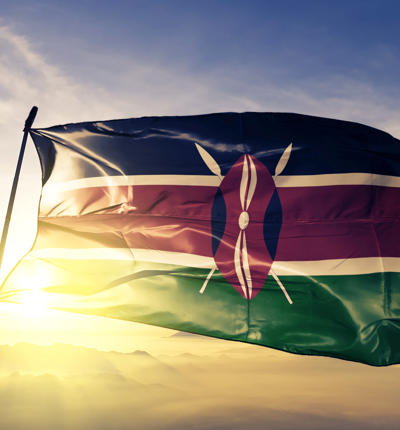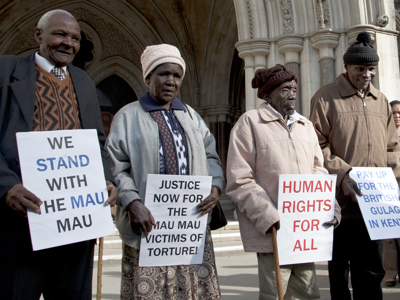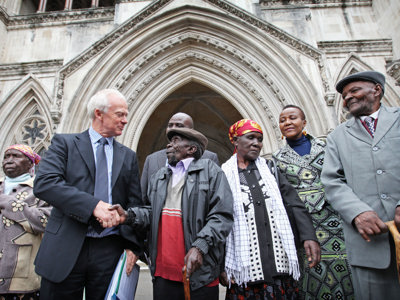
What King Charles should do on his State visit to Kenya
As King Charles makes his first visit to Kenya as British Monarch, he will acknowledge the wrongs suffered by thousands of Kenyans at the hands of British forces but will stop short of apologising. Associate solicitor in Leigh Day’s international department, Walker Syachalinga, argues that the King should go further and apologise for the ill-treatment of Kenyans under British colonial rule.
Posted on 31 October 2023
When Prime Minister Rishi Sunak was asked to apologise for Britain’s involvement in slavery, he refused saying that ‘trying to unpick our history is not the right way forward’. In line with that approach, Buckingham Palace recently announced that King Charles will visit Kenya this week where, rather than apologise, he will merely “acknowledge the more painful aspects of the UK and Kenya’s shared history”.
That response is at odds with growing international momentum towards an apology and reparations for chattel slavery. On 14 – 17 November 2023, a number of Caribbean and African nations will meet at the Accra Reparations Conference under the theme “Building a United Front to advance the cause of justice and the payment of reparations to Africans.” The conference, which is organised by the African Union Commission and the Government of Ghana, illustrates the imperative for the British government to move from merely acknowledging its role in past horrors to apologising for them.
The wrongs suffered by the people of Kenya
The Palace announced that King Charles “will take time during the visit to deepen his understanding of the wrongs suffered in this period by the people of Kenya.” The wrongs suffered by the people of Kenya were well documented in The Mau Mau claims where Leigh Day acted on behalf of more than 5,000 Kenyan nationals who were subjected to torture, rape, castration and severe beatings at the hands of the British colonial administration after the proclamation of the Kenya Emergency in the 1950s. Leigh Day secured a compensation settlement on behalf of the Kenyan nationals amounting to £19.9m as well as a statement of regret on behalf of the British Government which was made by the then Secretary of State for the Foreign and Commonwealth Office.
Legal and political cover for the ill-treatment of Kenyans could be traced back to “… powers conferred by Acts of the United Kingdom Parliament, namely the British Settlements Act 1887 and the Foreign Jurisdiction Act 1890. Political authorisation for the proclamation had been given by resolution of the UK Cabinet of 14 October 1952.” On the evidence available, the High Court concluded that “… there is an amply sufficient documentary base to test what was known in London about excessive use of force in the camps throughout the period of the emergency and what London’s reaction to that knowledge …”
Therefore, when King Charles acknowledges ‘the more painful aspects of the UK and Kenya’s shared history’ he will be acknowledging the legal and political apparatus that the British government put in place to provide cover for the ill-treatment of Kenyans.
Echoes of the past
That apparatus, which was in place during the Kenya Emergency, was part of a tried and tested playbook for suppressing dissent echoing back to the era of chattel slavery. For instance, published letters and historical research suggests that a slave rebellion in Demerara (present day Guyana) in 1823 which resulted in the execution of many of the enslaved people, was put down by British soldiers who also opened fire on the rebels. Prior to that in 1816, enslaved Africans revolted in Barbados in what is called Bussa’s rebellion. The rebellion was put down in part with the involvement of British troops stationed on the Island representing the Monarch. Similarly in 1831, when enslaved Africans in Jamaica revolted in the Baptist War demanding fair wages and an extra day’s holiday at Christmas, the revolt was put down with the help of the Kings Troops.
From acknowledgement to apology
So, calls for an apology from the British government are about much more than ‘unpicking history’, they go to the heart of what was devised and known in London about the ill-treatment of subjugated people across the British Empire. Moreover, there are clear parallels between the ill-treatment of Kenyans during the Kenya Emergency and that of enslaved people who rebelled to fight for their freedoms. Given the horrors suffered by Africans, whether in Kenya during the Emergency or on plantations as enslaved people, King Charles must move on from mere acknowledgement of the wrongs suffered by so many to an apology.

The Mau Mau claims
Leigh Day acted on behalf of 5,000 Kenyan nationals who were subjected to torture and other forms of ill-treatment at the hands of the British colonial administration during the Kenya Emergency in the 1950s.



